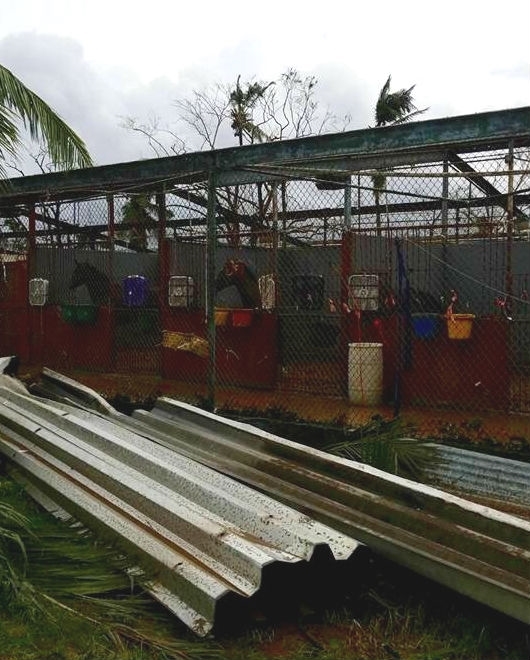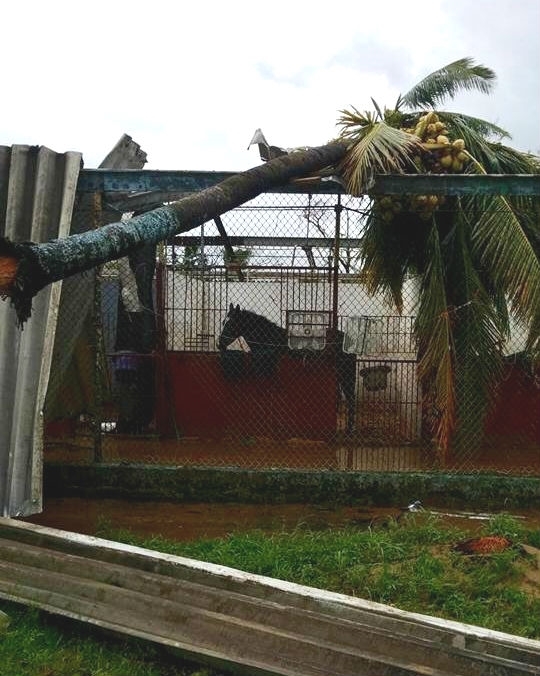By: Erin Shea,
@BH_EShea
Both the human and animal population of Puerto Rico are struggling to regain their footing after the island was pounded by Hurricane Maria Sept. 20. Many are scrambling to secure food, water, electricity, and signals for mobile phones, and included in the chaos are approximately 950 horses at Hipodromo Camarero. One 501c3 charity, Caribbean Thoroughbred Aftercare, is trying to do whatever it can for the island's Thoroughbred population.
Officially formalized as a tax-exempt charity in the U.S. at the end of 2016, the CTA has representatives working both on the ground in Puerto Rico and in the States to rally support. Shelley Gagnon-Blodgett, CTA's director who is based in Florida, said the organization acts as a bridge to help Thoroughbreds in Puerto Rico and in the U.S. Virgin Islands find homes off the track with many of those homes being back in the States.
"We are a resource to help bridge the gap from racing to retirement for the horses down there," Blodgett said. "Over half of the horses that are in Puerto Rico come from the States, but all of the horses racing in Puerto Rico are U.S. horses—they are Jockey Club-registered, even the ones bred in Puerto Rico are Jockey Club registered."
On Sept. 25, BloodHorse published an update on the various industry members offering aid to the Thoroughbreds in Puerto Rico, which can be read here.
Blodgett on Sept. 24 provided updates to BloodHorse on the situation as heard from her fellow CTA staff (especially chief financial officer Kelley Stobie), what can be done to help, and what it possibly means for the future of the CTA. Quotes have been edited for brevity and clarity.
What's the situation?
"We have 16 off-the-track Thoroughbreds and they are fine. They rode out both Irma and Maria. We have them at a farm at the top of a mountain that's a very well structured facility.
"The issue is the track... they have gotten some water but it's not enough. There are small amounts of water coming in and they were rationing it, and each horse was getting a quarter of a bucket. I know in the days leading up to the storm getting hay was a problem ... the reason is, after Irma and all, the south of Puerto Rico is where most of the hay comes from and they were having a lot of rain and a lot of standing water so they weren't even able to get out and bale hay like they normally do.
"The other thing is that 90% of the roofs are off of the barns and there's a lot of rubble and debris around ... they have people who rode out the storm with the horses (at Camarero) but the normal caretakers and the folks who would come in to help out are dealing with their own issues."

Hipodromo Camarero after Hurricane Maria. Photos courtesy of Caribbean Thoroughbred Aftercare
What can be done to help?
"We're collecting money. We don't really know what we're going to do with it because when this is all said and done we're not really sure what's going to be needed. But we are assuring people that the money will go to help these horses one way or another—maybe it's the horses who are on the track or the onslaught of people wanting to retire their horses after this because racing isn't going to resume for a while.
"The other thing (to do) is to put pressure on the government to take action ... when the USDA (United States Department of Agriculture) goes in and their APHIS (Animal and Plant Health Inspection Service) goes in and assesses, they go in for the whole island and we're really trying to get them to go and see the racehorses ASAP. Because we know those horses are not going to last."
What does this mean for the CTA?
"We don't have the regular support at this time. ... When I fundraise, almost all of it comes from the U.S. from race fans and horse lovers. We're limited in the capacity right now of what we can do, unless say a breeder wants to take their horse back ... (it's hard) for the ones that don't have somebody paying for (them) because they have to do a seven-day USDA quarantine and then fly to Miami. Even just the quarantine and the flight home is about $2,600-$2,700 and that's just getting as far as Miami.
"I think it's also a big eye opener for a lot of people because a lot of people don't realize what's going on with Puerto Rico, the racing industry down there, and the number of horses down there and thinking about them being U.S. horses. I think (the situation is) driving that point home."




